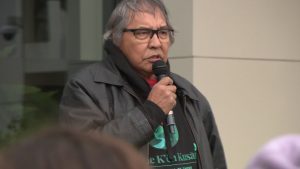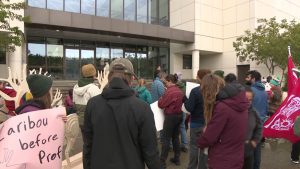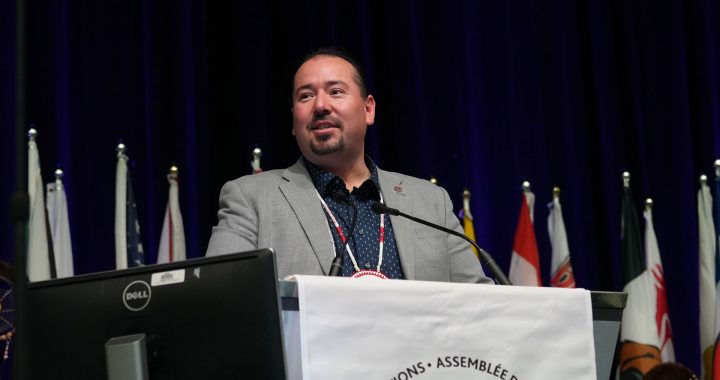Dozens of demonstrators gathered outside the Yukon courthouse late last week in support of the Kaska Nation’s appeal of a decision regarding the proposed Kudz ze Kayah mining project.
The appeal centers on a decision released earlier this year by Yukon’s Supreme Court.
Chief Justice Suzanne Duncan found the territorial and federal governments, which are decision bodies for the project, mostly upheld their duty to consult with the Kaska prior to greenlighting the project to advance to the next stage in the approval process.
But the Kaska disagree.
Ross River Dena Council (RRDC), on behalf of the Kaska Nation, which is made up of five Dene-speaking First Nations in Yukon and B.C., appealed – arguing Duncan erred in her decision.
The matter was heard in Yukon’s Court of Appeal during a two-day hearing last week.
Testloa Smith, a Kaska Elder who spoke at the demonstration, said his people are concerned that the $381 million open-pit mine, located 115 kilometres south of the Yukon community of Ross River, will impact the Finlayson caribou herd.
“The caribou…sustain us. That’s why I’m here today,” he said.
Smith also noted the legacy of abandoned mines on Kaska territory, such as the Faro, Wolverine and Ketza.
“The big mining companies come, and they enter our village, they talk to us. ‘We got concerns,’ we say, but they don’t hear us,” he said. “They have a lot of interests in that area. So that mine is their foot in the door for them. They’ll probably be there for a long, long time.”

RRDC Chief Dylan Loblaw said the Kaska are taking a stand to protect future generations.
“We’d like to ensure that they get to enjoy the same things that we all get to enjoy today and be able to preserve those things…What we do here today will impact tomorrow,” he said.
Loblaw feels current mining practices in the North aren’t unsustainable.
“We’re seeing a lot of things being mismanaged when it comes to our natural resources,” he said.
Chief Stephen Charlie of the Liard First Nation said “the Kaska will never give up.”
“It’s our land, and we want to be the decision makers on our land,” he said.

Appeal heard in court
The territorial and federal governments signed off on the mine proceeding to the regulatory phase in June 2022.
The Kaska filed a judicial review the following month alleging the Crown did not uphold its duty to consult with them before issuing a decision on the mine.
Duncan’s decision states the Crown had mostly acted reasonably when consulting with the Kaska.
However, she ordered the decision document allowing the project to proceed to the regulatory process be set aside to allow for a consultation meeting regarding a last-minute submission by the Kaska just hours before the mine was approved to proceed.
A revised decision document released following Duncan’s ruling again recommended that the project be able to proceed.
Mark Youden, lawyer for the Kaska Nation, argued Duncan erred in her decision.
He said the Crown did not uphold its duty to consult with the Kaska, especially in terms of economic feasibility.
He also argued the lower court mischaracterized the Kaska as being difficult during the consultation process and that the remedy Duncan provided in her decision was too restrictive and inflexible, further preventing the governments from upholding their duty to consult with the Kaska.
But lawyers for the Attorney General of Canada, the Yukon government and BMC disagreed.
They said Duncan didn’t err and that her decision was reasonable.
BMC lawyer Roy Millen said the Crown wasn’t required to accommodate the Kaska in a manner that they sought fit.
He also said the Kaska have asserted rights but not “proven title.”
“If you don’t have Aboriginal title, because you haven’t proven it yet, and the government hasn’t agreed with you in a treaty, then you don’t get that right (to reject a project),” he said. “You can still say ‘yes or no,’ but you don’t have the right to veto.”
During closing arguments, Youden said none of the other parties showed any evidence the Crown consulted with the Kaska about economic feasibility prior to a decision being made.
“We wholeheartedly disagree with the positions…put forward today,” he said.
Mining company to continue project
Allan Nixon, BMC’s vice-president of external affairs, said the company is committed to having the Kaska be full participants in the project and that the appeal process “does not change this long-standing and ongoing commitment.”
He said the company would continue to advance the project through the licensing process.
The appeal court reserved its decision.
It’s likely to be several months before its released.










